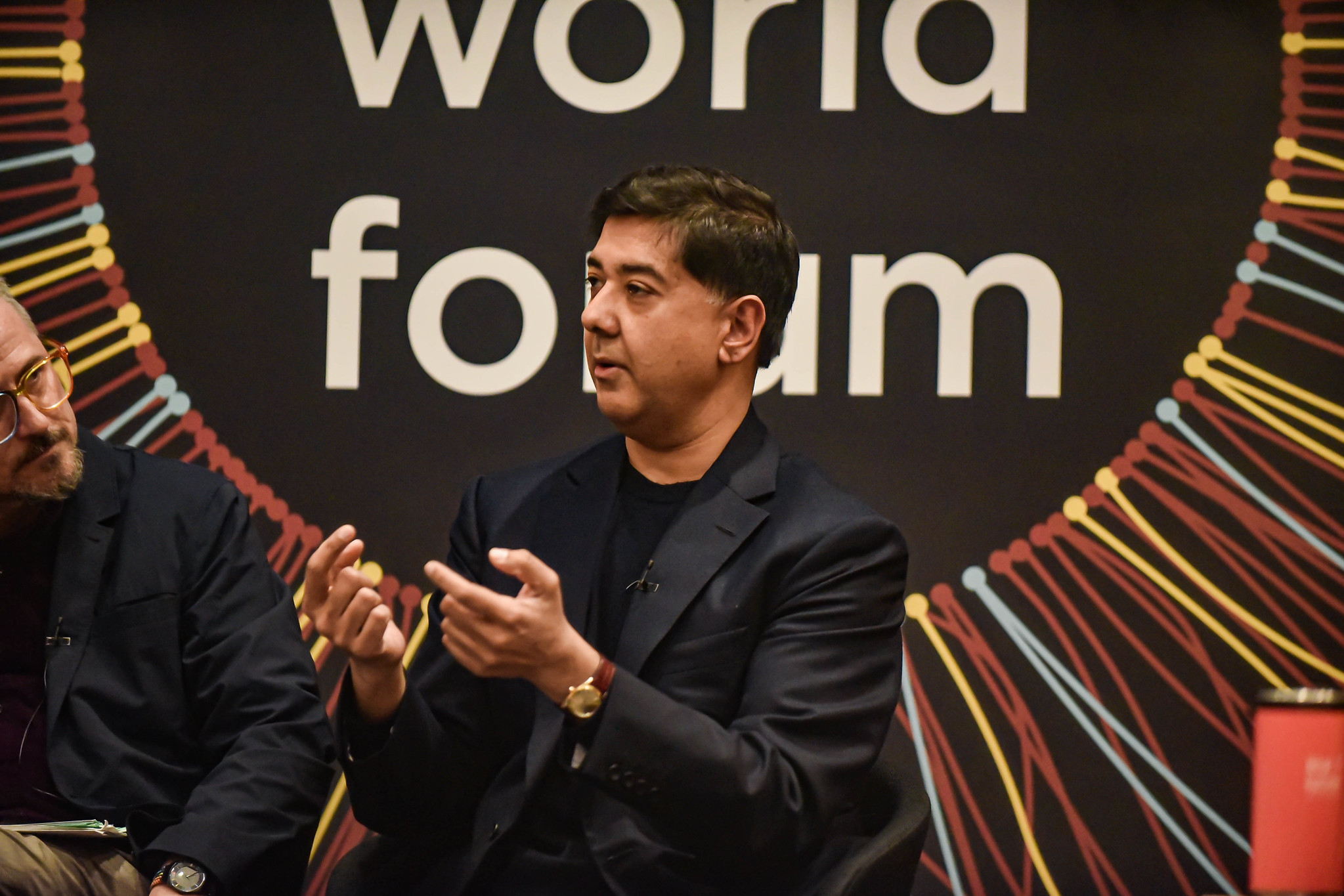Skoll World Forum Explores Using AI for Good, Countering Disinformation
Attendees at the Skoll World Forum on Thursday discussed how to fight disinformation and harness AI for good ends, while honoring four organizations working on a range of issues.

Imran Ahmed, Reclaiming Truth in the Age of Information Disorder, Rhodes Trust Lecture Theatre, SBS. Skoll World Forum 2024
Spreading antisemitism and anti-Muslim hatred. Encouraging self-harm among teenage girls. Live-streaming of terrorist attacks. Spreading lies about political candidates and misinformation about voting procedures.
Social media and artificial intelligence-powered deep fakes have shown their downsides.
Attendees at the Skoll World Forum on Thursday learned about how to fight back against the nefarious uses of technology while also leveraging AI, machine learning and other technology for social progress. Skoll also on Thursday bestowed awards to several organizations working across health care, agriculture and more for their social innovations.
Mis- and disinformation is more than mean posts on the Internet. It can and does cause “real world harms” that can fuel genocides and otherwise “affect people’s lives, health and democracies,” said Mevan Babakar, news and information credibility lead at Google, on a panel discussion.
Imran Ahmed, founder and CEO of the Center for Countering Digital Hate, described how he saw antisemitism spread via online memes a decade ago among “elements of the British Left,” and the online conspiracy theories that surged ahead of the Brexit referendum in 2016 that spread Muslim hatred and misinformation about election rigging.
It created an environment that led, in June 2016, to the assassination of Member of Parliament Jo Cox.
“It broke my heart because I realized that politics wasn’t viable with the wave of weaponized disinformation that was sweeping over our country,” Ahmed said. He saw similar conspiracy theories proliferate elsewhere, including Brazil, Hungary and the U.S.
More recently, anti-vaccine information spread on Facebook and other social media platforms during the pandemic contributed to 200,000 preventable deaths, Ahmed said.
Fighting back such mis- and disinformation can include both working with – or, in some cases, fighting – the big technology companies behind those platforms, he said.
Rather than banning certain types of speech, “what we can do is force genuine transparency from these companies, of their algorithm, of their content enforcement policies,” Ahmed said. “We need meaningful accountability – better equipped bodies that can hold them responsible.”
He also called for legal reforms to the U.S. law known as “Section 230” to make it easier to hold tech companies accountable for user-provided content on their platforms.
Other frontline resources to fight back include groups such as Full Fact, a UK-based independent fact-checking charity where Babakar served as deputy CEO before joining Google. Full Fact uses AI technologies to scale up the work of automated fact checking.
Tools like that underscore the power of technology to do good, which also got attention Thursday at a separate panel on how artificial intelligence and large language models can be used positively. The discussion featured presentations from four nonprofits that use data and technology to improve lives around the world.
Rikin Gandhi, CEO of Digital Green, explained how one of its products, an AI-powered chatbot called Farmer.chat, allows farmers to ask conversational questions in their local language. It’s intended to improve agriculture practices while encouraging gender equity and overcoming digital literacy barriers.
Debbie Rogers, CEO of Reach Digital Health, detailed her nonprofit’s efforts to improve health care across sub-Saharan Africa. Reach Digital Health does that in part by using an AI-powered diagnostic health engine to help users address health concerns. Nonprofits may not have the financial resources of big tech companies, she said, but they can still use AI and related tools to improve their offerings.
Skoll Awards for Social Innovation
One nonprofit working to fight disinformation was among four honored Thursday as winners of the Skoll Award for Social Innovation. The annual prize honors groups and individuals that lead transformational social change worldwide.
The Skoll Foundation awards each winner $2 million and support in scaling up their work and increasing their impact. The winners “show us what’s possible when we harness creativity and innovation, and support the ambition to bring big solutions to scale,” said Marla Blow, president and COO of the foundation.
This year’s winners are:
- IllumiNative, a U.S. non-profit that works to improve representation in the media of Native American people to ensure Native stories are authentically told, to re-educate Americans, and to mobilize support for Native issues.
- Kenya’s Food for Education, which feeds children at schools across the country while supporting local farmers, and has plans to expand across Africa.
- Meedan, a U.S. technology non-profit that develops tools to help news organizations collaborate and verify information with the goal of halting the spread of disinformation.
- India’s SaveLIFE Foundation, which works to reduce motor vehicle fatalities across India through a systems-based approach that improves road safety while also boosting access to emergency care.
The Skoll World Forum wraps up on Friday with a closing plenary session that features Amal and George Clooney as speakers.
<< Updates from the Skoll World Forum
